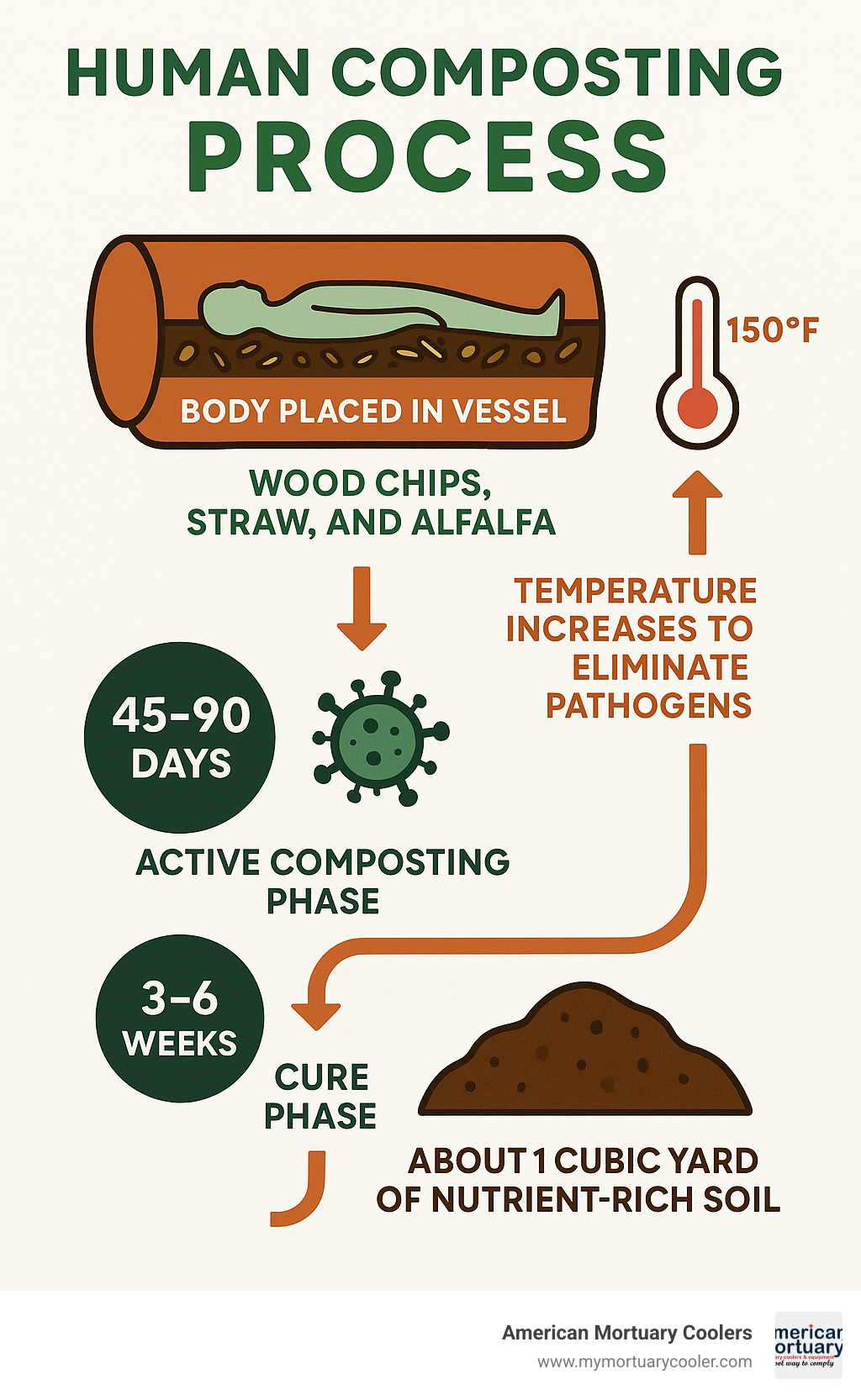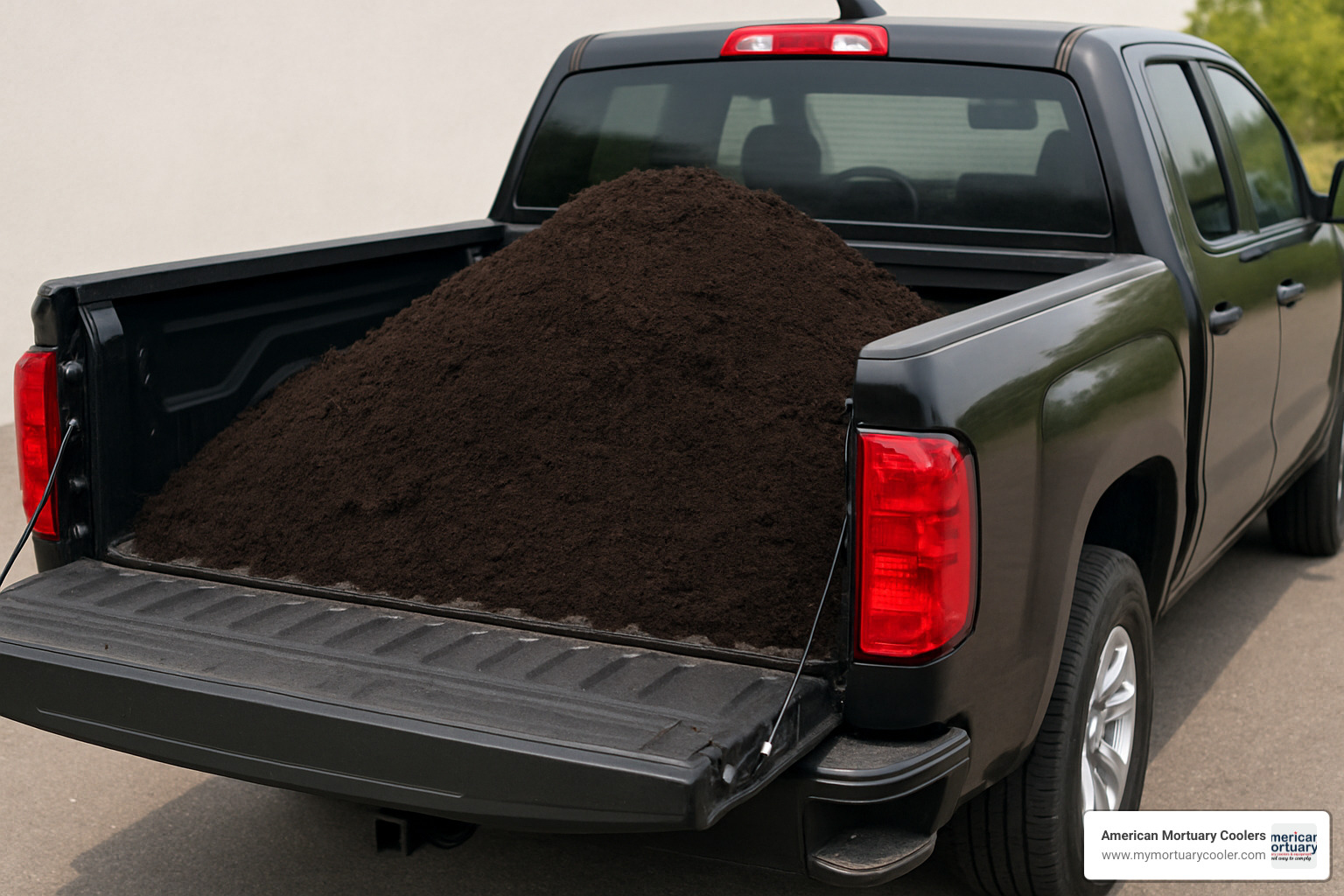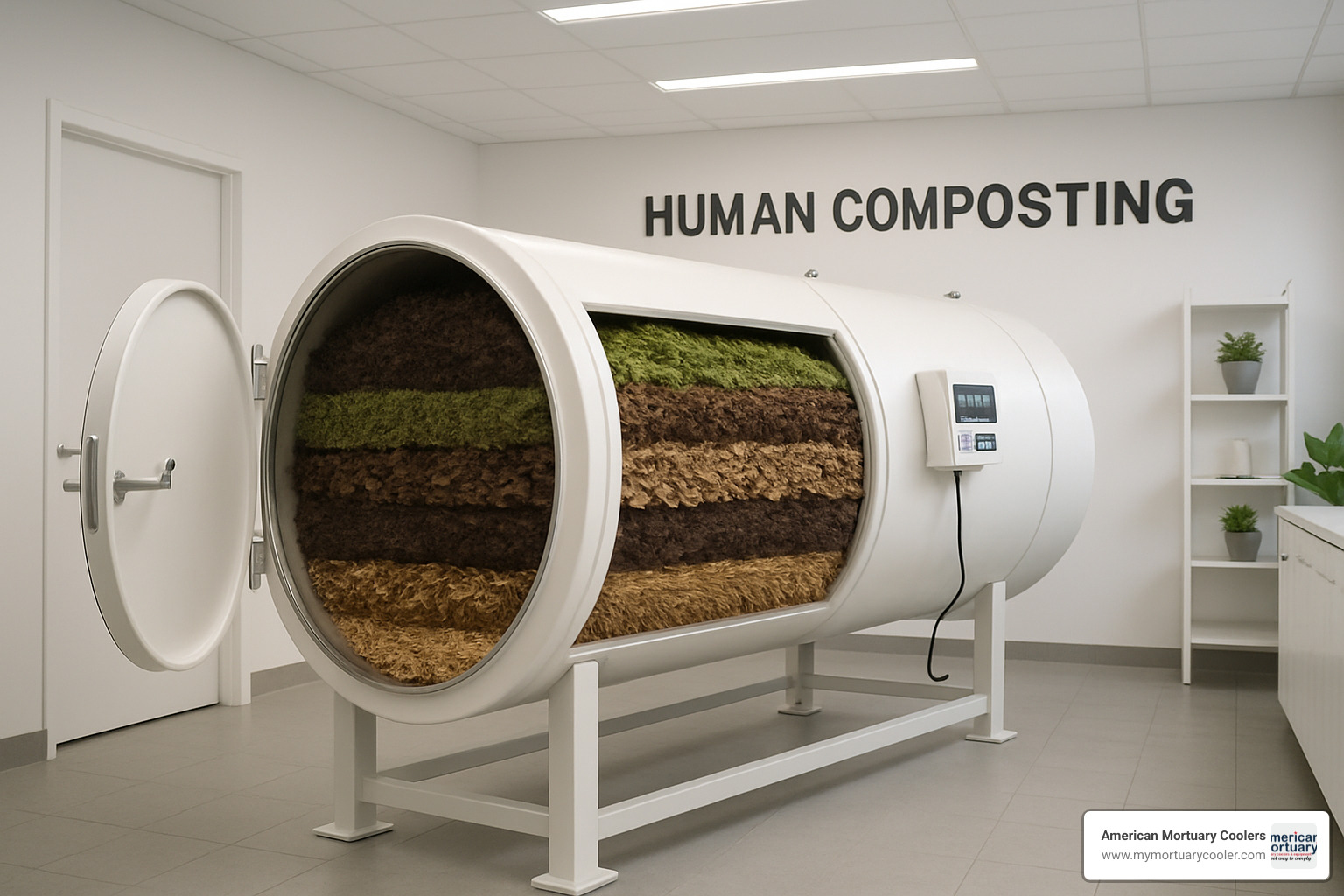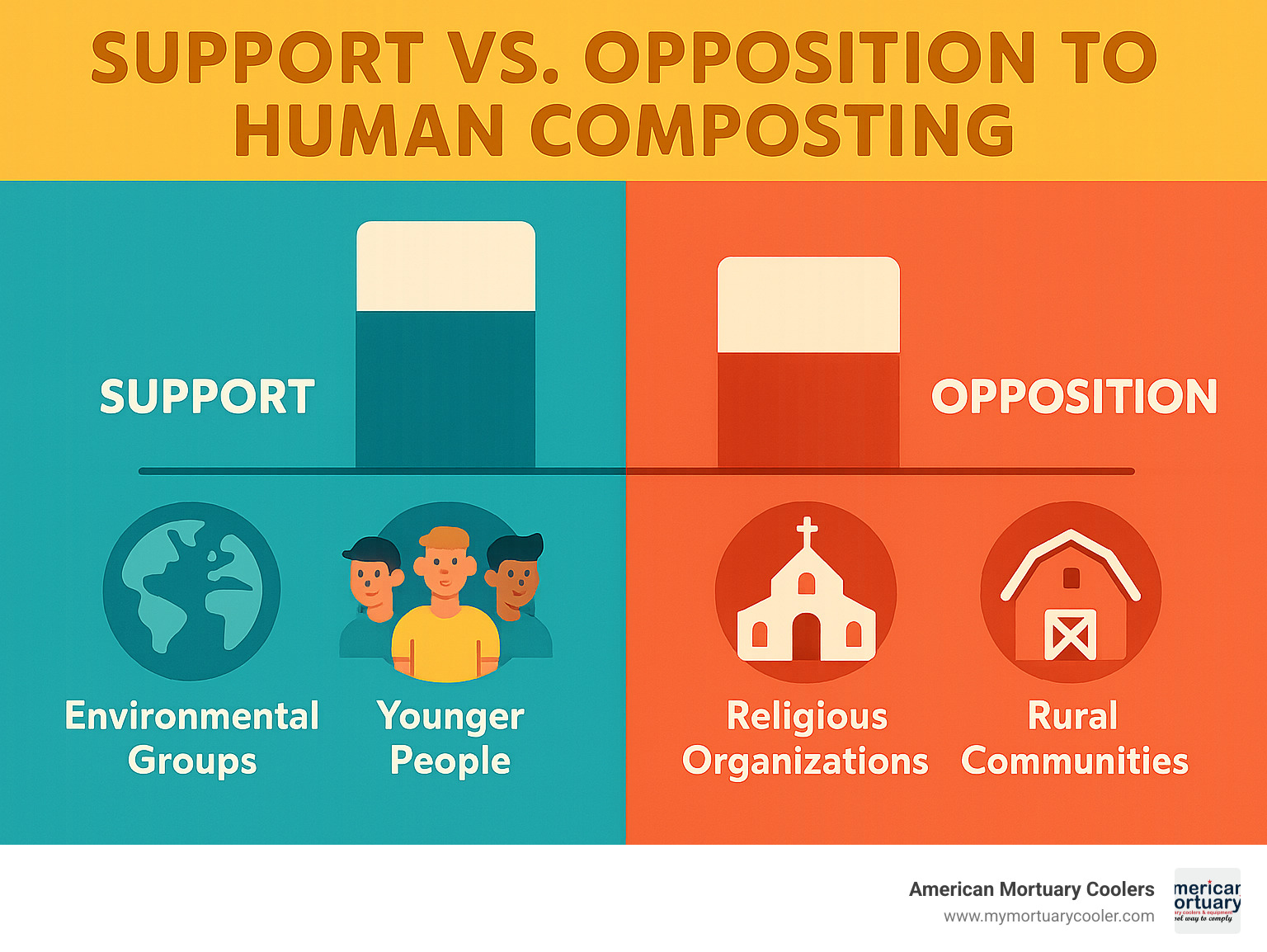
The Definitive Guide to Human Composting Options in Chicago
Why Chicago Residents Are Exploring Human Composting as a Green Death-Care Option
Human composting Chicago searches have surged as residents seek eco-friendly alternatives to traditional burial and cremation. While Illinois hasn't legalized human composting yet, Chicago families can access these services through out-of-state providers.
Quick Facts for Chicago Residents:
- Legal Status: Not yet legal in Illinois (House passed HB 3158, awaiting Senate vote)
- Current Access: Available through transport to Seattle-based facilities
- Total Cost: ~$10,500-12,000 ($7,000 service + $3,500-5,000 transport)
- Timeline: 8-12 weeks for complete soil change
- Soil Output: About 1 cubic yard of nutrient-rich compost per person
The process transforms human remains into soil using wood chips, alfalfa, and straw in a controlled vessel. Temperatures reach 150°F to eliminate pathogens, then natural microbes break down the body over 45-90 days.
Religious groups like the Catholic Church oppose the practice, arguing it "undermines human dignity." Environmental advocates counter that human composting saves over one metric ton of carbon compared to cremation or burial.
Chicago funeral homes are preparing for potential legalization. Many already partner with Seattle facilities like Recompose to handle transport logistics for interested families.
As American Mortuary Coolers with years of experience in death-care equipment, we've watched the growing demand for sustainable options including human composting Chicago services. Our company has supplied cooling systems to facilities exploring innovative body-care technologies nationwide.

Handy human composting Chicago terms:
How Human Composting Works: Science & Step-By-Step
Human composting Chicago residents ask about works just like nature intended - by copying what happens on the forest floor every day. When leaves fall and animals pass away naturally, tiny microbes get to work breaking everything down into rich, dark soil. The same biology powers human composting.
The magic happens when a body meets the perfect recipe of organic materials. Wood chips provide structure so air can flow through. Alfalfa adds nitrogen for the microbes to feast on. Straw brings carbon to balance everything out. It's like making the world's most important compost pile.
These aren't random materials thrown together. The mixture creates ideal conditions for aerobic decomposition - the healthy kind that doesn't smell bad or create problems. The microbes already living on our bodies team up with the ones in the organic materials to do what they've done for millions of years.
Temperature tells the safety story. The composting mixture naturally heats up as microbes work, reaching between 131-160°F. Scientific research on composting temperatures proves these hot conditions must stay above 150°F for at least three straight days to kill every pathogen - viruses, bacteria, parasites, all gone.
Staff check temperature, oxygen, and moisture levels throughout the process. They occasionally rotate the vessel so microbes can reach every part. The complete change takes 45-90 days depending on conditions and which provider handles the service.
The 3 Phases of Natural Organic Reduction
Phase 1: The Laying In (1-2 days)
This phase often includes a meaningful ceremony where families help place their loved one in the vessel. The body gets surrounded by those carefully chosen organic materials - wood chips, alfalfa, and straw. Many families find comfort in this ritual and add biodegradable flowers or handwritten letters as part of saying goodbye.
Phase 2: Active Vessel Phase (5-7 weeks)
The real work happens during these weeks. Inside the sealed vessel, microbes begin breaking down tissues while the controlled environment maintains perfect temperature, moisture, and oxygen levels. Staff monitor everything through sensors and periodic checks. The vessel gets rotated weekly to ensure even decomposition throughout.
Phase 3: Curing & Screening (3-5 weeks)
Once active decomposition finishes, the material moves to aerated bins for curing. The compost needs time to stabilize and mature. Any remaining bone fragments get reduced to powder and mixed back in. Final screening removes non-organic items like dental work or surgical implants, which get recycled whenever possible. What emerges is about one cubic yard of nutrient-rich soil ready to help new life grow.
Legality & Availability in Illinois: Where Chicago Stands
Illinois stands at a crossroads with human composting Chicago legislation. The state could soon become the seventh in the nation to legalize natural organic reduction, but the path hasn't been smooth.
House Bill 3158 made significant progress when it passed the Illinois House with a decisive 63-38 vote. Rep. Kelly Cassidy sponsored the bill, and she's so confident in the practice that she updated her own will to specify natural organic reduction. The legislation now waits for Senate consideration, where the outcome remains uncertain.
The bill doesn't just legalize human composting - it creates a complete regulatory framework. Facilities would need special licensing, compost must meet mandatory testing standards, and operators must follow strict protocols for handling remains. These safeguards address public health concerns while giving families a new choice.
Right now, Chicago residents wanting human composting must work with out-of-state facilities. Bodies need proper transport permits to cross state lines, and embalming is prohibited since chemicals would disrupt the natural decomposition process. Local funeral homes can handle the logistics, but it adds complexity and cost.
Washington blazed the trail in 2019 as the first state to legalize human composting. Colorado, Oregon, Vermont, California, and New York followed with their own versions. Each state developed unique rules, but all require facilities to maintain those crucial 150°F temperatures and pass rigorous safety tests.
The Catholic Church has emerged as the strongest opponent. The Archdiocese of Chicago argues human composting "degrades the human person and dishonors the life that was lived." Church leaders worry the practice conflicts with beliefs about bodily resurrection and proper treatment of human remains.
Key Supporters & Opponents
The battle lines are clearly drawn in Illinois. Environmental advocates champion the practice's ability to save over a metric ton of carbon per person. They point to growing climate concerns and the need for sustainable death-care options.
Rep. Kelly Cassidy leads the charge, emphasizing personal choice and environmental benefits. She's joined by organizations focused on climate action and families frustrated with resource-intensive burial practices. Companies like Recompose and Return Home also support the legislation, though they can't lobby directly.
On the opposing side, the Archdiocese of Chicago has mobilized significant resources against the bill. Retired chancellor Daniel Welter testified that human composting dishonors human life and conflicts with Catholic teaching about the body's sacred nature.
Some funeral industry associations worry about regulatory compliance costs and training requirements. Traditional cemetery operators also express concern about reduced demand for burial plots, though the impact would likely take years to materialize.
The debate reflects America's changing attitudes toward death and environmental responsibility. Younger generations increasingly prioritize sustainability, while older residents often prefer traditional practices rooted in religious or cultural beliefs.
For human composting Chicago advocates, the Senate vote represents a crucial moment. Success would make Illinois a leader in sustainable death care, while failure would delay access for families seeking eco-friendly options.
Why Choose Human Composting: Environmental, Cost & Health Impacts
When Chicago families consider human composting, the environmental benefits often surprise them. Each person who chooses natural organic reduction saves approximately one metric ton of carbon pollution - that's like taking a car off the road for 2,481 miles or preventing the burning of 1,102 pounds of coal.
Traditional cremation tells a different environmental story. The process burns fossil fuels at scorching temperatures around 1,600°F for hours, producing about 535 pounds of CO2 per body. That's equivalent to driving from Chicago to Nashville. The high-heat process also releases toxic particulates into the air we all breathe.
Conventional burial practices carry their own environmental baggage. Embalming pumps formaldehyde and other chemicals into bodies that eventually leach into groundwater. The funeral industry consumes 4 million acres of forest annually just for casket manufacturing. Add concrete vaults and ongoing cemetery maintenance, and the resource footprint grows substantially.
Human composting eliminates these environmental impacts entirely. No fossil fuels burn during the process. No toxic chemicals enter the soil or air. No land gets permanently removed from productive use. Instead, families receive nutrient-rich soil that can help gardens flourish or restore damaged ecosystems.
The financial picture varies significantly. Human composting averages around $7,000 for the service itself - more than basic cremation but less than full-service burial. For human composting Chicago families, transport costs add $3,500-5,000 to work with Seattle facilities, bringing totals to $10,500-12,000.
While that sounds steep, consider Chicago burial costs. The median burial runs $8,300 plus cemetery plot fees that easily exceed $10,000 in desirable locations. Suddenly, human composting doesn't look so expensive.
Health concerns often worry families initially, but the science provides reassurance. Strict temperature requirements eliminate all pathogens during the process. The final compost undergoes thorough testing before release. Unlike cremation ashes, which can actually harm plants due to high pH and salt content, human compost has a balanced pH of 6.5-7 and provides beneficial nutrients for plant growth.
Carbon & Resource Savings Explained
The 87% energy reduction comes from working with nature instead of against it. Cremation forces temperatures over 1,600°F using about 30 gallons of fuel per body. Human composting relies on natural microbial heat generation, requiring only minimal electricity for vessel monitoring and air circulation.
Water usage tells an equally compelling story. Cemeteries demand constant irrigation, landscaping, and groundskeeping that consumes thousands of gallons annually per plot. The composting process uses no additional water beyond natural moisture in organic materials like wood chips and straw.
The resulting soil provides ongoing environmental benefits through carbon sequestration. When families use the compost in gardens or donate it for forest restoration, that soil continues storing carbon while supporting new plant growth. Scientific research on carbon footprints consistently confirms these advantages, positioning human composting as the most sustainable end-of-life option currently available to families.
| Death Care Option | CO2 Emissions | Energy Use | Land Impact | Average Cost |
|---|---|---|---|---|
| Human Composting | Carbon negative | 87% less | Beneficial soil | $7,000 |
| Cremation | 535 lbs CO2 | High heat/fuel | Minimal | $3,000-6,000 |
| Traditional Burial | 1+ metric ton | Moderate | Permanent loss | $8,000+ |

Human Composting Chicago: Providers, Logistics & Planning
Right now, Chicago families interested in human composting have three main options, all located out of state. The good news? These providers have streamlined the process to make it surprisingly manageable, even from hundreds of miles away.
Recompose in Seattle was the first commercial human composting facility in the world. They've helped over 500 families nationwide and really know what they're doing. Their 33-vessel facility looks more like a modern spa than what you might expect, and they offer both immediate services and pre-planning options. The whole process takes about 8-12 weeks, and they have beautiful ceremony spaces if you want to travel there for the laying-in.
Return Home operates out of Auburn, Washington, and they've won NFDA "Best of the Best" awards for their approach. What sets them apart is their completely passive process - no machinery, just natural decomposition. They're big on family involvement and transparency, which many Chicago families appreciate. They also serve all 50 states and have excellent pre-planning programs.
Earth Funeral runs multiple facilities and goes the extra mile with environmental commitment. They plant five trees for every service and use renewable energy to keep their operations carbon-neutral. Their timeline is faster at about 45 days, and they partner with conservation organizations if you want to donate your soil to restoration projects.
Since Illinois hasn't legalized human composting yet, every Chicago family needs to arrange transport to these out-of-state facilities. It sounds complicated, but it's actually become pretty routine. Bodies typically fly from O'Hare to Seattle, and local funeral homes handle all the permits and logistics. The key requirement is no embalming - those chemicals would interfere with the natural composting process.
Here's what you're looking at cost-wise: the base service runs about $7,000, transport adds another $3,500 to $5,000, and your local funeral home will charge $500 to $1,000 for coordination. Total cost lands between $11,000 and $13,000 for most Chicago families. Many providers offer payment plans to spread out the expense, and pre-planning can lock in today's pricing.
The cost breakdown details show exactly where your money goes and help you budget accordingly.
Arranging "human composting Chicago" Today
Getting started is easier than most people expect. All three major providers offer 24/7 support for immediate needs, or you can schedule a consultation for pre-planning. The key is having everything arranged before you need it.
The process flows like this: First, you contact your chosen provider directly. Recompose can be reached at 206-800-8733, and Return Home at 206-888-4663. They'll walk you through options and pricing, then help you select a local funeral home partner who knows the transport requirements.
Next comes the paperwork - permits for interstate transport, facility intake forms, and decisions about what happens to your soil afterward. This part takes a few days, but the providers handle most of it remotely.
When the time comes, transport typically happens within 1-2 days. The body flies to the facility in a special container, and the composting process begins. Some families choose to travel for the laying-in ceremony, though it's not required.
After 8-12 weeks, you'll receive notification that the soil is ready. You can take home as much as you want - usually about one cubic yard, which weighs 500 to 1,000 pounds. That's enough to fill a pickup truck bed and create meaningful memorial gardens.
Many families split their soil between immediate use and longer-term projects. Some scatter it in meaningful places, plant memorial trees, or use it for houseplants that become living memorials. Others donate unused portions to conservation projects - Recompose partners with land restoration efforts, while Return Home operates "The Woodland," a protected area specifically for donated soil.
Ceremony flexibility is a big advantage. You can hold traditional services before transport, travel to the facility for the laying-in, or plan memorial services when the soil returns. The providers work with various cultural and religious traditions, understanding that meaningful rituals matter regardless of your ecological values.
Comparing Chicago Green Death-Care Choices
While we wait for human composting Chicago to become legal, other eco-friendly options exist right now. Each has different benefits depending on what matters most to you.
Alkaline hydrolysis, also called water cremation, is already legal in Illinois. This process uses warm water and alkaline solution to speed up natural decomposition. It uses one-tenth the energy of flame cremation and produces no direct emissions. The timeline is days rather than months, and costs are lower than human composting. The downside? You get liquid nutrients and bone ash instead of usable soil.
Natural burial preserves operate within driving distance of Chicago. These designated woodland areas allow burial without embalming, concrete vaults, or non-biodegradable caskets. Bodies decompose naturally in beautiful forest settings. Costs range from $3,000 to $8,000 depending on location and services. The main difference from composting is permanent land use rather than portable soil creation.
Municipal scattering rules in Chicago currently allow ash scattering in designated Lake Michigan areas and some parks with proper permits. Similar regulations would likely apply to human compost once it becomes legal, though specific rules remain to be written.
Each option serves different values and budgets. Natural burial offers immediate availability and lower costs but requires permanent land. Alkaline hydrolysis provides quick, clean processing without soil benefits. Human composting creates the most usable end product but requires the most time and money.

Beliefs, Debates & Future Action in the Windy City
The human composting Chicago conversation touches something deeper than just funeral preferences - it's really about how we view life, death, and our responsibility to the planet. Religious communities find themselves wrestling with tradition versus environmental stewardship. The Catholic Church has drawn a firm line, with leaders arguing that human composting reduces people to "banana peels" and conflicts with beliefs about bodily resurrection.
Jewish communities show more flexibility. While Orthodox traditions typically require burial, Reform and Conservative rabbis increasingly weave environmental considerations into their teachings. Some have even developed eco-liturgies that honor both religious tradition and ecological values.
For secular families, the choice often feels obvious. As one Chicago resident put it, "I've spent my whole life trying to reduce my carbon footprint - why stop when I die?" These families see human composting as the ultimate expression of environmental values.
Personal stories from families who've made this choice are incredibly moving. One woman described using her father's soil to plant a memorial oak tree: "Every spring when it leafs out, I feel connected to him and to the earth he loved."
Chicago's funeral industry is paying attention. Funeral directors are attending training sessions and preparing for potential legalization. Many funeral homes already partner with Seattle facilities to help families steer the current transport requirements.
The generational divide is real. Younger Chicagoans tend to accept the environmental benefits, while older residents often prefer traditional practices. But there's more crossover than you might expect - plenty of grandparents are choosing composting to leave a better world for their grandchildren.

How to Advocate for "human composting Chicago" Legislation
With HB 3158 sitting in the Illinois Senate, every voice matters. The bill passed the House 63-38, showing significant support, but the Senate vote remains uncertain.
Contacting your state senator makes the biggest impact. Personal calls carry more weight than form letters, so share your own story. Mention the environmental benefits, the successful track record in other states, and the importance of personal choice.
Community education helps counter misconceptions. Many people picture something gross or unsafe when they first hear about human composting. Hosting informational sessions through environmental groups, libraries, or even death cafes can help people understand the science and safety measures involved.
Chicago's existing green burial groups provide natural advocacy networks. These organizations already understand ecological death care and can expand their focus to include composting.
Frequently Asked Questions about Human Composting Chicago
The timeline question comes up constantly. The complete process takes 8-12 weeks from start to finish. Active decomposition happens over 5-7 weeks, then the soil cures and gets screened for another 3-5 weeks.
Safety concerns are totally understandable. The 150°F+ temperatures maintained for at least three days eliminate all pathogens - viruses, bacteria, parasites, everything. Final testing verifies safety before families receive their soil.
Organ donation compatibility surprises people. Yes, you can absolutely donate organs and then choose human composting. Medical professionals remove organs at hospitals, then the body can undergo composting without any embalming.
What happens to medical implants?
Non-organic materials get carefully removed during the screening phase. Pacemakers, joint replacements, dental work - it all gets sorted out. Metal implants typically go to recycling programs, while other materials get disposed of properly.
Can soil be used in city parks?
Current rules don't specifically address human compost in public spaces. Once human composting becomes legal, the city will likely develop guidelines similar to ash scattering rules. Private property use should be unrestricted, following the pattern in other states.
How much does it really cost in Chicago?
Total costs run $10,500-13,000 for Chicago residents, which includes transport to Seattle facilities. The base composting service costs $7,000. Transport and logistics add $3,500-5,000. Local funeral home coordination typically runs $500-1,000. Pre-planning programs help manage costs by locking in current pricing and offering payment plans.
Conclusion & Next Steps
The journey toward human composting Chicago availability reflects something deeper happening in our city - a growing recognition that our environmental values shouldn't end when we do. As Chicago residents increasingly accept sustainability in life, it makes sense they'd want the same choices in death.
The numbers tell a compelling story. Each person who chooses human composting saves over a metric ton of carbon while creating beneficial soil instead of consuming precious resources. That's equivalent to taking a car off the road for 2,481 miles - a meaningful contribution to the climate action many Chicagoans already champion.
Illinois sits tantalizingly close to joining six other states that have acceptd this practice. HB 3158 passed the House with solid support, and Senate approval could make Chicago the first major Midwest city with legal access to human composting. The economic potential is significant too - facilities here would eliminate the $3,500-5,000 transport costs that currently make the option expensive for local families.
At American Mortuary Coolers, we've had a front-row seat to the death-care industry's remarkable evolution. Our custom cooling systems now serve facilities nationwide that are pioneering everything from alkaline hydrolysis to natural burial preparation. The innovation happening in death care mirrors what we've seen in other industries - driven by families demanding better options that align with their values.
The funeral homes we work with consistently tell us the same thing: families want choices. Some prefer traditional services, others seek eco-friendly alternatives, and many want something in between. Human composting adds another meaningful option to that spectrum, especially for environmentally conscious Chicagoans who've spent their lives caring about sustainability.
For those ready to take action, the path forward is surprisingly straightforward. Contacting your Illinois state senators takes just minutes but can influence whether this option becomes available locally. Many residents don't realize how much individual voices matter in state-level legislation - especially on newer issues where senators may not have heard much constituent feedback.
The practical steps matter too. Researching current providers and discussing preferences with family members helps prepare for either immediate needs or future planning. Pre-planning programs offered by companies like Recompose and Return Home can lock in today's pricing while giving families time to make thoughtful decisions without pressure.
Chicago's environmental community has already built strong networks around sustainability issues. Green burial groups, climate action organizations, and even death cafes provide natural gathering places for people interested in ecological death care. These communities often become the foundation for successful advocacy efforts.
The conversation about sustainable death care is happening whether we participate or not. By staying engaged, Chicago residents can help shape how these options develop locally rather than waiting for others to decide. The city's history of environmental leadership - from green building standards to renewable energy initiatives - suggests we're well-positioned to lead the Midwest on this issue too.
The future looks promising for human composting Chicago availability. Legislative momentum is building, public awareness is growing, and the death-care industry is adapting to serve families who want these options. Whether motivated by environmental concerns, cost considerations, or simply wanting more choices, Chicago residents increasingly see human composting as a natural extension of their values.
The question isn't whether sustainable death care will come to Chicago - it's whether we'll help shape how it develops. By supporting current legislation, researching options, and joining ongoing conversations, we can ensure that future generations have access to death-care choices that honor both the people we love and the planet we share.
For detailed information about costs, legal requirements, and processes nationwide, explore these comprehensive resources:



